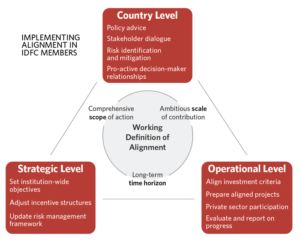- An internal working definition of alignment can serve as a common basis for implementation throughout the organization by clearly articulating how the institution will contribute to the Paris Agreement objectives and by sending a clear signal to staff, external market participants, and other stakeholders that climate action underpins the institution’s development objectives. The working definition can describe how the scope, scale, and time horizon dimensions of alignment apply to the institution.
- For publicly mandated development finance institutions, the ability to implement alignment will be greatly facilitated – or constrained – by their countries of operation, both through enabling environments as well as the influence of governments on IDFC members through their Boards. However, IDFC members are also uniquely positioned and trusted to support governments to contribute most effectively to the objectives of the Paris Agreement, to which they have all agreed. Therefore, we propose in this study that alignment starts with the special relationship IDFC members have with the governments in their countries of operation.
- Paris alignment will require executive leadership to influence how decisions are made and the modalities to execute them. Alignment can be embedded in the strategic level of the organization by adopting institution-wide objectives; a well-structured incentive and support system, and an updated risk management framework.
- At the operations level, alignment requires changes in how investments are assessed and how capital is deployed. All investments across the institution’s operations will need to be assessed against alignment criteria, and capital should be deployed using modalities that help deliver the transformative change necessitated by the Paris Agreement.

While IDFC members share a common goal, the differences between them in terms of internal capacity, mandate, national circumstances, and resources imply a range of possible short-term paths. However, these must converge with urgency towards activities reflecting the full scope, scale, and time horizon of the Paris Agreement objectives.
The transition to alignment for the IDFC, individually and collectively, will not be easy, and it will take time – and therefore it should start now. With the roadmap to alignment presented here as a guide, members can scale up and build upon successful examples of existing practices with the sustained, focused effort required across all activities for the Paris Agreement’s goals to be met.
While meeting this challenge will require unwavering commitment and engagement from members themselves, partnerships with others outside the IDFC will be vital. Collaboration with other financial institutions, both public and private, will be needed to streamline methodologies, metrics, and programming; reduce duplication; and accelerate the development of appropriate policy and financial instruments. Most crucially, IDFC members will need support – both political and financial – from the international community and shareholder governments to reach their potential to drive investment towards a Paris-aligned future.
Mandated by the International Development Finance Club (IDFC) and the European Climate Foundation, Climate Policy Initiative (CPI) and the Institute for Climate Economics (I4CE) conducted a research project in two parts:
- Part 1, led by I4CE, establishes a theoretical and conceptual basis for alignment, analyzing and describing the emerging interpretations of the definitions, principles, and approaches across the financial community, and builds on the experience of the Climate Action in Financial Institutions Initiative.
- Part 2, led by CPI, identifies the changes the Paris Agreement implies for the role of Development Finance Institutions (DFIs) – specifically members of the IDFC – and how they may implement these changes through a targeted set of activities.